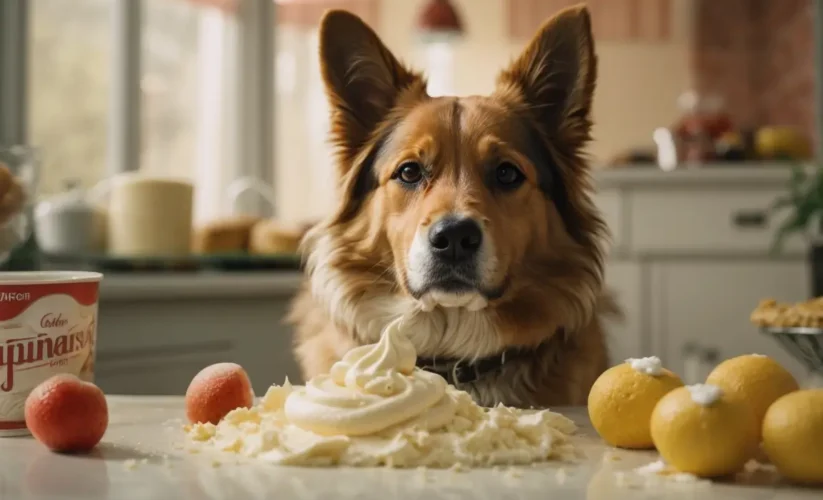Can dogs eat frosting?

As a devoted dog owner and experienced blogger in the canine world, I’ve encountered numerous questions from fellow dog lovers about what’s safe for our furry friends to eat. One such query that often pops up is: “Can dogs eat frosting?” It sounds simple, but the answer is layered, much like the frosting itself. Our dogs are more than pets; they’re family. And just like with any family member, we want to ensure what we feed them is both enjoyable and safe. This blog post delves into the sweet world of frosting and its effects on dogs, exploring not just the sugary treat itself but also the broader context of dogs and human desserts. Whether you’re a new dog parent or a seasoned owner, understanding the impact of such treats on your dog’s health is crucial. By examining the composition of frosting and its potential effects, both good and bad, on our canine companions, and extending the discussion to other common sweet treats like cupcakes, this article aims to provide a comprehensive guide to help you make informed decisions about your dog’s diet. So, let’s embark on this journey of discovery together, keeping the well-being of our four-legged friends at the forefront.
Is Frosting Good for Dogs?
The question of whether frosting is good for dogs is one that requires a nuanced understanding of canine nutrition. At first glance, the occasional lick of frosting might seem harmless, but it’s essential to consider the ingredients typically found in these sweet toppings. Frosting is predominantly made of sugar, fats, and sometimes chocolate or xylitol, all of which can have implications for your dog’s health.
Sugar, while not toxic, can lead to health issues in dogs when consumed in large amounts or regularly. It can contribute to weight gain, dental problems, and even diabetes. Furthermore, the high-fat content in many frostings can be difficult for dogs to digest and may lead to pancreatitis, a serious and painful condition. Dogs, unlike humans, do not require sugary treats for nutritional purposes and gain little to no health benefit from them.
In some cases, frosting may contain chocolate or xylitol, both of which are toxic to dogs. Chocolate contains theobromine and caffeine, which can cause vomiting, diarrhea, rapid breathing, increased heart rate, and seizures in dogs. Xylitol, a sugar substitute found in some sugar-free frostings, is even more dangerous. It can cause a rapid release of insulin in dogs, leading to hypoglycemia (low blood sugar), seizures, liver failure, or even death.
While a small lick of frosting might not cause immediate harm to a healthy dog, the potential risks associated with its ingredients make it an unwise choice for canine consumption. It’s important to remember that dogs have different dietary needs and sensitivities compared to humans. Therefore, as responsible dog owners, we must prioritize their health and dietary requirements over the temporary pleasure of a sweet treat.
Is Frosting Bad for Dogs?
Building on the previous section, it’s crucial to address more directly whether frosting is bad for dogs. The short answer is yes, it can be harmful. The high sugar and fat content in frosting can lead to both short-term and long-term health problems for dogs. In the short term, consuming frosting can cause gastrointestinal upset in dogs, including symptoms like vomiting and diarrhea. These are immediate reactions to an unusual and rich diet that their stomachs are not equipped to handle.
In the long term, the repercussions of regularly consuming frosting can be more severe. Obesity is a growing concern among pets, and sugary, high-calorie treats like frosting contribute significantly to this problem. Obesity in dogs can lead to a host of other health issues, including joint pain, diabetes, and heart disease. Additionally, the sweet treat can exacerbate dental problems. Dogs don’t brush their teeth as humans do, and the high sugar content in frosting can lead to tooth decay and gum disease, which can be painful and problematic.
Moreover, certain ingredients often found in frosting, like chocolate, xylitol, raisins, or certain nuts, are toxic to dogs. Even in small quantities, these ingredients can cause significant health problems. For instance, xylitol, even in tiny amounts, can cause a rapid insulin release in dogs, leading to liver failure. Chocolate, especially dark chocolate, contains theobromine and caffeine, which are toxic to dogs and can lead to severe health complications.
Given these potential risks, it’s advisable to avoid feeding your dog frosting. While it’s tempting to share our treats with our beloved pets, we must remember that their health and dietary needs are different from ours. It’s always better to err on the side of caution and choose dog-safe treats that are formulated to meet their nutritional needs without the risks associated with human desserts.
Are Other Cupcakes Safe For Dogs?
When considering cupcakes and other similar treats for dogs, the same principles apply as with frosting. While the occasional small piece of plain cupcake might not be immediately harmful, the ingredients typically used in cupcakes are not ideal for canine health. Cupcakes, like frosting, are high in sugar and fats, which are not necessary in a dog’s diet and can lead to the health issues discussed earlier.
Furthermore, many cupcakes contain additional ingredients that can be harmful to dogs. Chocolate is a common cupcake ingredient, and as previously mentioned, it is toxic to dogs. Even flavors that might seem harmless, like vanilla or lemon, often contain high amounts of sugar and can include artificial sweeteners like xylitol, which are extremely dangerous for dogs.
In addition, cupcakes often have toppings or fillings that can be problematic. Nuts, raisins, certain fruits, and chocolate chips are just a few examples of common cupcake ingredients that can pose health risks to dogs. Even if the cupcake itself is plain, these additions can make them unsafe for canine consumption.
It’s also worth considering the psychological aspect of feeding dogs human treats like cupcakes. Dogs can develop a taste for sweet, unhealthy foods, leading to behavioral issues such as begging or scavenging. This can disrupt their regular eating habits and make it challenging to maintain a balanced diet.
For dog owners who wish to treat their pets, there are many dog-safe alternatives available that are specially formulated to suit their dietary needs. These treats are a much safer option and can help ensure that your dog stays healthy and happy. Remember, what is a treat for humans can be a health hazard for dogs. It’s always best to keep our treats to ourselves and give our canine companions snacks that are tailored for them.
Final Thoughts
In conclusion, while it might be tempting to share a bit of frosting or a piece of cupcake with our furry friends, it’s clear that these treats are not suitable for dogs. The high sugar and fat content, along with the potential presence of toxic ingredients like chocolate and xylitol, pose significant risks to canine health. These human treats can lead to immediate digestive upset as well as long-term health problems like obesity, dental issues, and even more severe conditions like pancreatitis or liver failure.
As responsible dog owners, our priority should always be the health and well-being of our pets. This means making informed choices about their diet and avoiding the temptation to feed them foods that are meant for humans. There are numerous dog-friendly treats available that are designed to be both safe and enjoyable for our canine companions. By choosing these alternatives, we can ensure that our dogs are not only happy but also healthy.
Remember, each dog is unique, and what might be harmless for one dog could be harmful to another. If you’re ever in doubt about whether a food is safe for your dog, it’s always best to consult with a veterinarian. They can provide guidance tailored to your dog’s specific health needs and dietary restrictions. Let’s keep our dogs’ tails wagging with the right treats and a lot of love!










